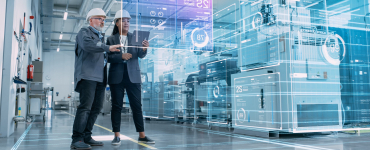- Survey among decision-makers in German companies: Vast majority support digitalization
- Companies must be fully prepared for digitalization in order to continue to survive in the future
Digitalization is driving economic growth in Germany, according to three out of four corporate decision-makers (76 percent). On behalf of eco – Association of the Internet Industry, the market and opinion research institute YouGov surveyed over 500 corporate decision-makers on the topic of digitalization of the German economy (1). The result, presented today by the eco Association as part of the eco://kongress in Cologne, is very clear: Enterprises in Germany must completely adjust to digitalization, in order to be able to continue to exist in ten years, according to 87 percent of respondents. 73 percent agree with the statement that medium-sized companies also profit from new sales opportunities on the world markets due to the digitalization of supply chains.
“Companies in Germany, as well as the German federal government, both recognize the potential of digitalization for our economy and society,” says Oliver Süme, Chair of the Board of the eco Association. “What is needed now is targeted support for key technologies such as the Internet of Things (IoT), blockchain, and artificial intelligence, in order to allow successful digital transformation to occur and to secure the future competitiveness of German companies on the world markets.”
Smart technologies for the future
IoT is of major importance here: the manufacturing industry in Germany today must connect production facilities into the “Internet of Things” in order to remain globally competitive in the future. This statement found resonance with 81 percent of German corporate decision-makers. However, this will only succeed if the solutions are secure. 90 percent of respondents agreed that increasing connectivity in the “Internet of Things” presents companies with new security challenges.
Companies are tackling these growing security challenges with methods such as artificial intelligence (AI). AI and machine learning can support those responsible for cyber security in routine tasks: for example, in correctly evaluating security warnings – a statement that 72 percent of decision-makers agree with. In a few years, AI systems will largely autonomously diagnose cyber attacks, a view shared by 62 percent of respondents.
(1) The data used are derived from an online survey by YouGov Deutschland GmbH, in which 541 company decision-makers took part between 15.11.2018 and 21.11.2018. All of the above results are based on this sample.



